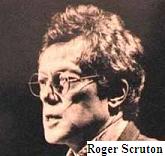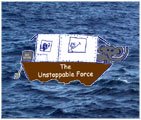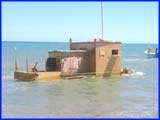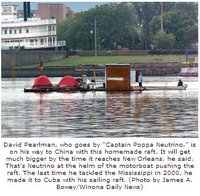 The Seige of Vicksburg and The Velocity of Time
The Seige of Vicksburg and The Velocity of TimeI am cursed and blessed by memory. When two and a half years old, I rode in the back seat as the Ford passed farms and climbed the hill. I got out with my parents and walked into the Old Stewart Place to see my uncle sweeping gravel out of the living room, as the house had been abandoned and used to stable horses. Max, my uncle, had Down's Syndrome in today's parlance. In those times he was mongoloid. He looked at me, smiled, went on sweeping. The house had been owned by an ancestor, Doctor David Stewart, captain in the 28th Iowa Volunteer Infantry during the Civil War. He fought at Vicksburg and returned home to take a seat in the Iowa State legislature. Uncle Max passed away years ago. Doctor Stewart died long before I was born. They fell out of time into memory and I now have an ancient reprint of a picture taken in 1863 of Captain Stewart in uniform with epaulettes and brass buttons.
I touch the picture, feel the edges, note the sepia and white, and wonder about a light that captured it like this, froze it into a minor immortality before the years work at the edges, fade the tones, blur the features. There is decay in this thing I hold and I seem to feel it under my fingers, indiscriminate of flesh or paper, a rot impartial to all, except the picture knows nothing about it while I do. Then TS Eliot comes to mind—"I will show you fear in a handful of dust." That is an unsettling thought, so I tell myself that the paradox is merely one of concepts—emotion and matter. Still, concepts are what we have.
I also have Dr. Stewart's medical accounts book. It is a big book, bound in heavy, brown, padded leather, its pages ruled and columned. "March 10th, 1879. Set Abe Gentry's broken arm," one entry says, then explains, "He paid in ten bushels of corn and promised to work the South Forty next spring." Another states simply, ""Will Langtree's son, Jake, knocked on the door in the middle of the night. I dressed and grabbed my bag while Jake hitched Bess to the buggy. Hurried to the Langtree place. Delivered the wife of an eight pound girl. Came home, too tired to arrange accounts." When a boy, I imagined the doctor and his family on Sunday morning, his wife and children climbing into their surry, and the horses trotting to church in the village. Try as I might, though, I cannot summon much today. Instead, I think of the mystery that enfolded them as it does me. The world feels solid, real. We awaken to the sunrise, then we warm to summers, chill into winters, and suddenly we are gone.
Instead, I sometimes think of the sky that hovered over them like a mask, veiling the black infinitude of space, making the day warm and bright, as if it were the way the world was, and make no mistake. As they rode off to church, a Turkish regiment attacked an Assyrian village, a Chinese peasant drowned in the Yangtze, a prostitute in London felt Jack The Ripper's knife. Here is God's plenty as well.
We live by lies, some of them useful. We live by memories, all of them reminders. The best reminders are not the sieze-the-day sort, but those which tell us something there is that no photograph can explain. As I look at this picture I know that light, travelling at 186,000 miles per second, captured the Doctor's eyes as he gazed into the camera lens, expecting that somehow the future would be better than the past. I can use scientific datum to explain the event, but how can I render the person? The War of The Rebellion would one day be over and school children would read about it as the Civil War. He would return home. He would marry and father children. He would grow old gracefully. How is it that he reaches me on this distant shore of time, this Twenty First century while he remains in the Nineteenth? He touches me with his hopes, his tribulations, his genes. I am his bridge to the future. I live in a time beyond his ken; he, in one beyond mine.
That mystery serves like TS Eliot's paradox. For me, it is what we have in place of the certitude of data. We are all incessantly hurled out of the past into the future, despite our self-reminders to live for the day. Our Earth spins its equatorial girth 25,000 miles every 24 hours. We don't sense it. This planet orbits the sun at 67,000 miles per hour, and yet we feel a different kind of change, that which moves our muscles, ages our skin, dims our hopes. How can we judge magnitudes when death is more calamitous than a major shift in the solar system? We are caught up in our own velocities, which numbers cannot explain.
Perhaps memory itself is orbital, and we always cycle through the same life, committed to time's strange entropy. We await disorder, the uncertain future, and leave patterns in our wake. Perhaps we loop through time and space in an eternal return. That would be fine so long as I experience no déjà vu. I would like that. Captain Stewart lays down his rifle, returns home, and resumes his medical practice. The Ford stops at the Old Stewart Place, I get out, and see Uncle Max. You read about me holding the picture and once again it is all new.



















